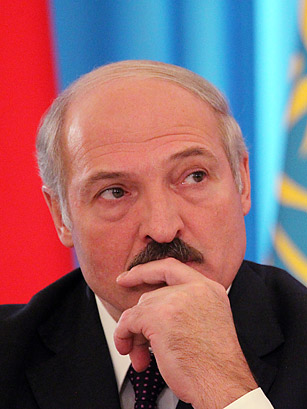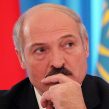
Lukashenka’s Rating and Belarusian Identity
Publication: Eurasia Daily Monitor Volume: 11 Issue: 177
By:

The September national survey by the Independent Institute for Socio-Economic and Political Studies (IISEPS), the most trusted Belarusian polling firm, headquartered in Lithuania, shows that both the electoral rating of President Alyaksandr Lukashenka and public trust vested in him have gone up. Whereas in June, 39.8 percent of Belarusians expressed readiness to vote for him if presidential elections were held “today,” in September 45.2 percent did. In March, 45.9 percent of Belarusians trusted Lukashenka and by June 49.6 percent did. However, by September, the share of those trusting their president had reached 53.5 percent (svaboda.org, October 1).
Considering that the ratings of the most electable (or rather least unelectable) leaders of the opposition are on par with the poll’s margin of error of plus/minus 3 percent, and that only 14.1 percent of the Belarusians trust the opposition at large whereas 63.3 percent do not (gazeta.ru, October 2), Lukashenka’s likelihood of reelection one year prior to the actual vote, thus, appears to be sky-high. And this is despite the fact that, in August, the average wage in Belarus actually declined—and yet, in September, Lukashenka’s rating registered growth. The president’s popularity used to closely track the dynamics of Belarusians’ personal incomes—a dependency repeatedly uncovered by earlier research. But this connection has apparently now been entirely shattered. The analysts are unanimous: First, the crisis in Ukraine converted the notion of Belarus’s stability from a propaganda cliché into a palpable reality. The respective change in perception is all the more acute as Ukraine is a culturally close neighboring country situated in the same geopolitical space (between Russia and the West) as Belarus, and yet Ukraine’s economic system and quality of its leaders pale beside those of Belarus in the eyes of most Belarusians. Second, Lukashenka’s pacifying mission and his balancing act—not siding with any of the warring parties but not positioning the country to the point of estranging any of them—is also to the liking of most of Belarus’s population (Belorusskie Novosti, October 1).
In this regard, three phenomena deserve scrutiny—new statements made by Lukashenka, the evolution of his image in the eyes of the least Lukashenka-friendly Belarusians, and the influence of the crisis in Ukraine on Belarusian identity.
On September 29, during his meeting with the members of Belarus’s House of Representatives, Lukashenka declared that more attention must be paid to the Belarusian language in secondary schools, that Belarusians should not count on income growth in the near future, and that the documents underlying the Eurasian Union and subject to ratification should be scrutinized lest Belarus is put at a disadvantage. According to Alyaksandr Klaskovsky, Belarus’s veteran opposition journalist, Lukashenka’s sudden care about Belarusian, which has not been the language of instruction in the overwhelming majority of urban schools since the 1960s, is directly influenced by the events in Ukraine’s war-torn eastern region of Donbas. There, as virtually everywhere in Belarus, a non-Russian language as a token of national identity has been missing and that makes people vulnerable to Russian expansionism (Salidarnasts, September 30). The increased attention to the Belarusian language as well as Belarusian interpretations of a common history (e. g., of the 19th century Napoleonic invasion) have already been castigated by some ideologues of Russian nationalism, notably by Modest Kolerov, president of REGNUM, Russia’s information agency. According to Kolerov, Lukashenka has long been surreptitiously nurturing well-entrenched strains of Belarusian ethnic nationalism and Russophobia (Regnum, September 28). Such claims even make statements by opposition activist Zianon Pazniak, the founder of the Belarusian Popular Front, appear modest by comparison.
Lukashenka recently also provide an interview for Euronews, in which he made at least six revealing statements. First, both sides of the conflict in Ukraine have reportedly realized they cannot win militarily. Second, it might be possible to dispatch the Belarusian military as a peacekeeping force in Ukraine. Third, according to Lukashenka, the West, notably the United States, bears responsibility for the February “coup d’état” in Ukraine and for the ensuing war because the “official representatives” of the US instigated that war and even bragged they had spent $5 billion on Ukrainian democracy. Fourth, the new Ukrainian authorities themselves gave Russia a pretext for intervention to defend Russian-speakers. Fifth, it was the US that set the example for interventions in other countries without an international mandate. And yet, Lukashenka believes that internationally recognized borders should not be challenged and the territorial integrity of Ukraine should, thus, be maintained. Finally, he declared that legitimizing Russia’s annexation of Crimea by pointing to the flimsy circumstances of its incorporation in Ukraine (as a Soviet republic) back in 1954 sets a wrong precedent. If one were to follow such logic, much of Russian territory should be returned to Mongolia and Kazakhstan because it was Batu Khan of Mongolia who once owned that land along with his Turkic warriors, Lukashenka argued (Belta.by, October 3).
Apparently reflecting Lukashenka’s soaring domestic rating and his improved international reputation, the Minsk-based correspondent of the Belarusian service of Radio Liberty Vital Tsyhankou opined that “Lukashenka is no longer an absolute evil”—not for the West and not even for the opposition (svaboda.org, October 3). And although many opposition-minded Belarusians subsequently condemned Tsyhankou’s remarks both on Radio Liberty’s website and on his Facebook account, it appears that he was just reflecting the actual change in widespread perceptions of the Belarusian leader.
However, the crisis in Ukraine also affected Belarusians in ways not immediately linked to the personality of their leader. The most uniform Belarusian responses in IISEPS’s entire September national survey regarded the public’s attitude to the possibilities of a) Russia’s military passing through Belarus to invade Ukraine and b) the participation of the Belarusian army in hostilities in Ukraine. Seventy-seven percent of Belarusians are against the former and 75 percent reject the latter. And this is despite the fact that most Belarusians approve of Russia’s actions vis-à-vis Ukraine. To Yury Drakakhrust of IISEPS and Radio Liberty, this consolidated response signifies no less than “a birth of a nation” (svaboda.org, October 1).
Just a year ago, the crisis in Ukraine had assumed parameters that were impossible to fully predict. But even less predictable was how meaningful this crisis has turned out to be for the neighboring country of Belarus.




